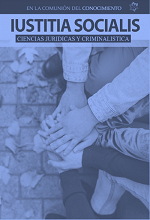The sale of medical supplies and its impact on tax fraud
DOI:
https://doi.org/10.35381/racji.v5i3.1092Keywords:
Taxation, public finance, civil law.Abstract
The investigation focused on analyzing the sale of medical supplies and its impact on tax fraud in Ecuador. Methodologically, it is of a descriptive documentary nature with a non-experimental bibliographic design, we worked with a population sample of 65 users of public health services in the midst of the COVID-19 pandemic. 65% of the people surveyed agree that it should be strengthened or toughen the penalties on corruption crimes with public goods taking, as well as interpretation that the surveyed citizens see viable that this is the solution. When analyzing the Ecuadorian legal framework, it was possible to show that there are a large number of laws which recognize and guarantee tax fraud, which support the over-price of medical supplies and its impact on society when they are resold or supposedly bought from a high price.
Downloads
References
Castro, M. (2020). Personal médico en Ecuador insiste en la falta de insumos de protección. [Medical personnel in Ecuador insist on the lack of protection supplies]. Recuperado de https://n9.cl/ncdh9
Código Orgánico Integral Penal, COIP. Registro Oficial Suplemento 180 de 10-feb.-2014. Última modificación: 05-feb.-2018. Recuperado de https://n9.cl/xu3yj
Código Tributario. Registro Oficial Suplemento 38 de 14-jun.-2005. Última modificación: 21-ago.-2018. Recuperado de https://n9.cl/h59fu
Constitución de la República del Ecuador (2008). Título II. Derechos. Recuperado de https://n9.cl/ddge
De-La-Torre-Lascano, C. (2017). Relación existente entre paraísos fiscales, lavado de activos y defraudación tributaria. Un análisis desde la normativa de Ecuador. [Existing relationship between tax havens, money laundering and tax defraud. An analysis from the norms of Ecuador]. Revista de la Facultad de Derecho, (43), 3-31. https://dx.doi.org/10.22187/rfd2017n2a2
Haro-Velastegui, F. A., Delgado-Daquilema, M. R., Absalón-Wilberto, G. R., & Arias-González, I. P. (2019). Defraudación tributaria y su incidencia en la sociedad [Tax fraud and its impact on society]. Ciencia Digital, 3(3.2), 258-265. https://doi.org/10.33262/cienciadigital.v3i3.2.749
Organización Mundial de la Salud, OMS. (2020). Uso racional del equipo de protección personal frente a la COVID-19 y aspectos que considerar en situaciones de escasez graves. [Rational use of personal protective equipment against COVID-19 and aspects to consider in severe shortages]. Recuperado de https://n9.cl/08wky
Peña, L. (2013). Ética y servicio público. [Ethics and public service]. Plaza y Valdés. Madrid. España.
Secretaría General de La República (2020). Otto Sonnenholzner: “El mayor enemigo debe ser el virus y no la desobediencia”. [Otto Sonnenholzner: "The greatest enemy must be the virus and not disobedience"]. Recuperado de https://n9.cl/d9ia
Zevallos, J. (2020). Ecuador tiene 121 millones de dólares para enfrentar la emergencia sanitaria del Covid-19, dice el nuevo Ministro de Salud. [Ecuador has 121 million dollars to face the health emergency of Covid-19, says the new Minister of Health]. Recuperado de https://n9.cl/fz0p
Published
How to Cite
Issue
Section
License
CC BY-NC-SA : Esta licencia permite a los reutilizadores distribuir, remezclar, adaptar y construir sobre el material en cualquier medio o formato solo con fines no comerciales, y solo siempre y cuando se dé la atribución al creador. Si remezcla, adapta o construye sobre el material, debe licenciar el material modificado bajo términos idénticos.
OAI-PMH URL: https://fundacionkoinonia.com.ve/ojs/index.php/Iustitia_Socialis/oai










